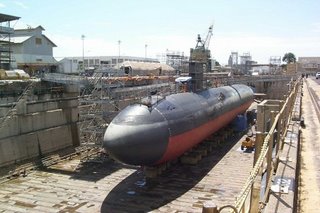 There are many causes of accidents at sea. Although a few can be categorized as unavoidable (i.e. the result of acts of God: rogue waves, lightening), the vast majority are attributable to human error.
There are many causes of accidents at sea. Although a few can be categorized as unavoidable (i.e. the result of acts of God: rogue waves, lightening), the vast majority are attributable to human error.For example, the Ehime Maru, the Japanese training vessel struck and sunk by the Attack Sub USS Greenville, would have been spared had the officers onboard the sub followed Navy procedure for the particular maneuvers they were conducting.
Originally, media reports tried to make a big deal of the distraction caused by the distinguished visitors onboard the sub. But on a nuclear powered warship, where you have military crews trained in the business of war and various life and death ship related emergencies, where crews are suppose to be capable of dealing with the most intense potentialities known to man, how can a few passengers (16) lead to such a tragedy?
In fact, the NTSB did cite the crew for failing to 'manage' the guests. However, the bottom line was: The officers failed in their duty. They did not follow procedure or take proper precautions prior to their emergency surfacing maneuver. As a result, nine people aboard the Ishime Maru lost their lives.
Complacency is a dangerous thing, because any boat, ship, plane or piece of heavy machinery becomes a liability in the hands of a person who, through ignorance, fatigue, or overconfidence, has no sense of pending danger or feeling that something at any moment can go wrong.
On May 10, 2004, an Alaskan ferry called the LeConte went aground on Cozian Reef. The reason? The first mate made an impromptu course change in order to bring the vessel on a more picturesque route. While doing so, he failed to heed a daymark. Both captain and mate were fired after the incident, which caused over $3 million in damages. There were no serious injuries.
although the NTSB listed crew fatigue and watch standing issues as the major cause, the root of the problem was complacency.
In the first example, procedures were in place but not followed, and while the media and members of congress took the opportunity to weigh in on the distinguished visitors policy of the Navy and recommend an end to the policy, I am aware of no significant changes regarding US submarine operations as a result of the incident. The same cannot be said for the latter example.
As a result of the ferry accident -- and other such accidents where fatigue was listed as a contributing factor -- the USCG and NTSB are considering rule changes and additional certification requirements for watchstanders.
Look for amendments to STCW (Standards of Training, Certification and Watchkeeping) regulations.
-seabgb
No comments:
Post a Comment